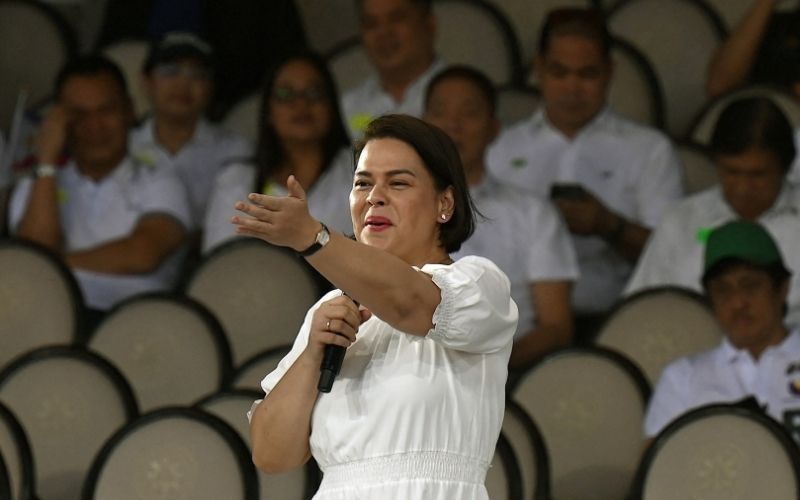
Upgrade to High-Speed Internet for only ₱1499/month!
Enjoy up to 100 Mbps fiber broadband, perfect for browsing, streaming, and gaming.
Visit Suniway.ph to learn
A news analysis
MANILA, Philippines — Before the 2025 midterm elections, the Senate left no doubt about its willingness to begin impeachment proceedings against Vice President Sara Duterte. But after the polls? Certainty began to waver.
After 215 House members impeached Duterte in February, all eyes were on the Senate to “proceed forthwith” with the trial as the Constitution mandates.
However, the transmitted articles of impeachment were not taken up on the Senate’s last plenary day before the break, leaving questions about when the proceedings would begin.
This was the first blow of criticism that the Senate, particularly Chiz Escudero as Senate president, received as the chamber’s sitting president.
Despite public clamor, even by legal luminaries, Escudero argued that impeachment proceedings could only start when the Senate is in session. He even made a whole schedule to assure the public it would happen and not be delayed.
But then came the election results. Escudero had informed the House that the articles would be presented on June 2 — the day Congress resumed — but later postponed it to the last plenary day on June 11, citing the need to pass priority legislation first.
The Senate had the entire break, when no plenary sessions were held to vote on bills, to ideally know at least an estimate of priority measures that still needed attention.
At the same time, Escudero raised arguments that cast doubt on the continuity and fairness of the impeachment trial:
- The Senate of the 20th Congress may opt not to proceed with the trial.
- The impeachment court has “no limits” on what it can or cannot decide, citing the motion to dismiss, which was later revised to a motion to return the articles to the House.
- As presiding officer, he claims he cannot enforce the rule barring senator-judges from commenting on the case’s merits, despite asserting the court has “no limits.”
So why a change of tune post-elections?
Senate presidency challenged
According to political scientist Cleve Arguelles, the Senate leadership is most likely a major factor influencing Escudero’s changing stance on the impeachment, especially with one of his predecessors, Senator-elect Tito Sotto, open to reclaiming the presidency.
“He fears, from what I see and how I see it, that he will lose the Senate presidency. And because of that, he’s pandering to the Duterte bloc,” he told Philstar.com in an interview.
“I think that’s becoming more and more obvious because these are the numbers that he would need,” Arguelles added. “And whoever gets the Duterte bloc’s vote, it appears, will actually win the Senate presidency.”
It’s clear the Senate race was a numbers game for the impeachment trial. When it showed a sharp split between Duterte-aligned candidates and the Marcos administration’s slate, doubts only grew.
Despite leading in pre-election polls early in the campaign, Alyansa bets suffered a setback, with only six of their 11 endorsed candidates winning.
Senator-elect Camille Villar, one of the admin’s bets, even distanced herself from her own slatemates, seeking Duterte’s endorsement and skipping Alyansa sorties toward the end of the campaign.
This shift was after authorities arrested former President Rodrigo Duterte for crimes against humanity charges by the International Criminal Court (ICC) in March.
To win the Senate presidency, a senator needs a majority vote. This translates to at least 13 out of 24 votes in their favor.
If Chiz secures the Duterte bloc
Open Duterte allies — Sen. Bong Go, Sen. Bato dela Rosa, Senator-elect Rodante Marcoleta, Sen. Imee Marcos and Sen. Robin Padilla — already make up five seats in the incoming Senate.
If Camille and Mark Villar also side with the Dutertes, as their family ties suggest, the bloc grows to seven. That’s just six votes short of securing the Senate presidency, should Escudero win their vote.
Escudero only became Senate president in May 2024 after Sen. Juan Miguel Zubiri resigned amid a petition backed by 15 senators to oust him.
Zubiri was surprised when Go, Dela Rosa and Padilla voted to remove him — a move he described as a betrayal when he considered himself a fellow Duterte supporter.
Sen. Alan Peter Cayetano, though currently an independent, has also been recognized by the Duterte bloc as an ally. He was Rodrigo’s running mate in the 2016 elections, who lost the vice presidency.
While Dela Rosa maintained he is not seeking to replace Escudero, he mentioned in interviews that Cayetano and Zubiri are also fit to lead, considering potential leadership changes.
According to reports, Go said the so-called Duterte bloc has agreed to vote as a unified group for the next Senate president. He also shared that Escudero and Sotto had sought their support for their bid.
Sen. Jinggoy Estrada, as Senate president pro tempore, expressed optimism about Escudero’s reelection, saying he prefers continuity in leadership as the Senate prepares to try the vice president.
If he and Cayetano also vote for Escudero, his possible backing would be up to nine.
Sotto’s party has numbers
Aside from the Duterte bloc, the Nationalist People’s Coalition (NPC), chaired by Tito Sotto, also counts several members in the 20th Congress. This includes Senators Lito Lapid, Sherwin Gatchalian, JV Ejercito, Loren Legarda and even Escudero.
In late May, Sotto said three to four members of the next Senate have asked him to return as Senate president. Although he didn’t name names, his long-time running mate Senator-elect Ping Lacson has openly declared support.
If all NPC senators besides Escudero vote for Sotto, this brings his potential backing to five.
Also an administration bet, Sen. Pia Cayetano vouched for Sotto’s leadership in the 18th Congress, even nominating him for Senate president, to which he ultimately secured.
Senator-elect Erwin Tulfo, from the Romualdez-led Lakas-CMD, said in interviews that both Escudero and Sotto had also reached out for a meeting, confirming they were both vying for the Senate presidency.
Tulfo, who campaigned with Sotto, said he hasn’t decided whom to support. He, however, acknowledged that he may vote differently from his brother, Sen. Raffy Tulfo.
Raffy was among those who voted to oust Zubiri in support of Escudero. Zubiri, on the other hand, supported Sotto’s Senate presidency in the 18th Congress.
If Pia, Erwin and Zubiri vote for Sotto, he may have the support of eight.
Bloc factor
Some members of the Senate have yet to reveal their preferences for the next Senate president, including Sen. Risa Hontiveros, Sen. Joel Villanueva, Sen. Raffy Tulfo, and Senators-elect Bam Aquino and Kiko Pangilinan.
Villanueva, however, was seen “coaching” Imee Marcos to cut off Hontiveros’ manifestation against the motion to dismiss the impeachment. It appeared as if he aligned with the Duterte bloc, despite his support for convening the court.
He has also publicly supported the Dutertes, even defending the Office of the Vice President’s 2025 budget from being slashed.
In the Senate, bloc alignments are usually shaped by the vote for its president. Those backing the winner form the majority, while those who vote for another candidate — or abstain — tend to make up the minority.
The Cayetanos broke from this convention, forming an independent bloc rather than joining either the majority or the minority, which was led by Sen. Koko Pimentel and Hontiveros.
Hontiveros is seeking to secure the minority, hoping for the support of Aquino and Pangilinan.
Although Escudero’s midterm endorsement may factor into their decision, Aquino and Pangilinan could ultimately side with their long-time ally Hontiveros in building a minority bloc.
If it does not pan out, Hontiveros said forming an independent bloc is a fallback option, particularly if Duterte gains the upper hand in claiming the minority bloc.
The 18-5 vote
The unprecedented decision of the impeachment court to grant Dela Rosa and Cayetano’s motion, voted by 18 and opposed by five, reflected how the Senate leadership shaped and potentially stalled the impeachment process by invoking alleged constitutional and procedural gaps.
Although it doesn’t determine the impeachment court’s final verdict, it may indicate how alliances are forming ahead of the Senate presidency vote.
“So I think what's really happening is that he’s (Escudero is) being blinded by his narrow political ambitions,” Arguelles said, suggesting this could explain why his arguments seem contradictory, irrational and defensive.
He added that Escudero’s change in behavior and staunch defense of his position may be driven by a strong desire to retain the Senate presidency, believing that the “end justifies the means.”
“As long as he gets to keep the Senate presidency, whether the Constitution is violated, its principles and its spirit are not reflected in the way that the Senate carries out its duty, then okay lang,” Arguelles said.
What makes the situation even more perplexing, he said, is that Sara appears to have a strong chance of being acquitted with the current Senate.
“I think there's also enough numbers or there is really a good pathway for acquittal,” he pointed out. “So it's just really perplexing why our senator judges wouldn't want to do the trial as demanded by the Constitution.”
Arguelles stressed that the focus should instead be on ensuring the trial proceeds, with due process observed, evidence laid out and Duterte given a fair chance to defend herself.
It's not about the verdict
Public sentiment, reflected in multiple surveys, points to a clear demand: the trial must take place. At this point, he said it's less about the verdict and more about affirming that those in power are not above accountability when serious charges are raised.
“Wala pang masyadong nagagawa, tainted na yung process. (Not much has been done yet, but the process is already tainted.) So towards the end, I fear that some of our fellow Filipinos might question the legitimacy and the acts of the impeachment court,” Arguelles said.
While the Duterte bloc claims gut issues like poverty and jobs deserve more attention than the impeachment, he argued that accountability over alleged stolen public funds is just as urgent, especially when those funds could have supported health, education and aid programs.
Arguelles also criticized Escudero for allowing senator-judges to push procedural moves not grounded in the Constitution or Senate rules, such as revising a motion to dismiss into a motion to send back the articles to the House of Representives.
“I think it's just really disappointing that the Senate president is enabling these kinds of procedures and processes na yes, they may be creative to a point, right?” Arguelles said.
“But the creativeness is maybe serving unconstitutional ends and very partisan ends as well,” he added.
With a presumption of regularity in government actions and a Supreme Court petition already pending, he questioned the need for a remand, warning that insisting on it under the argument of “no limits” could further weaken public trust in the government’s own checks and balances.
“Yes, in many aspects they get to decide on how to run the trial, but the bigger spirit of it is that they have to try and decide. … [T]hat's not up to the plenary powers of the Senate [not to],” Arguelles said.

 5 hours ago
3
5 hours ago
3



